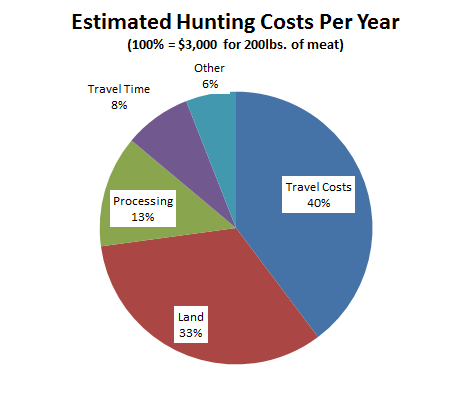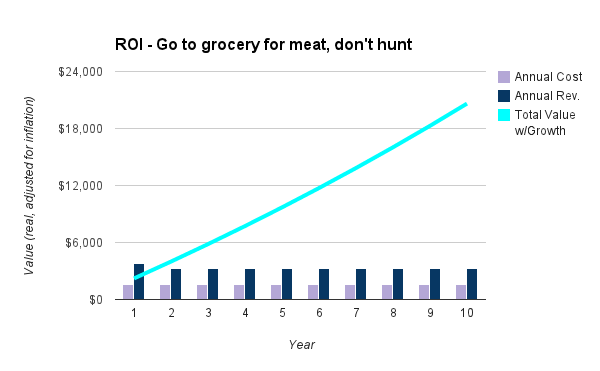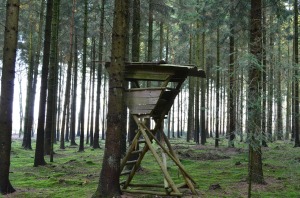Is hunting cost-effective? Probably not. My estimates show that hunting costs $2,000 more per year on average than simply buying meat from the grocery store (about $10 more per pound in this example). Why the steep price for such a seemingly ethical and idyllic way of procuring meat?
The main reason that hunting is more expensive than the grocery store is that we don’t live in the wild west anymore. Gone are the days of Elmer Fudd chasing game around just any old wood. Simply to be able to play the game, hunting today requires licenses, private land leases, and lots of driving, among other things:

As seen above, at least according to the assumptions I used in this example, direct travel costs and land expenses account for nearly 3/4 of the money spent during a year of hunting. And to be fair, I believe these are fairly optimistic assumptions.
The Numbers
In this example, I’m assuming 200 pounds of meat are needed per year. The grocery costs of this meat are estimated at an average of $8 per pound, or $1,600 a year. The hunting assumptions come primarily from this blog post and this Yahoo questions page. The numbers include:
- $1000 per year for land lease
- $50 per year for a hunting license
- $50 per year for ammo
- $400 per year ($2/lb) for processing/butchering
- 4 hunting trips per year with 1 kill per trip for an average of 50 pounds of edible meat per deer
- 150 miles each way to hunting spot at $0.50 per mile (4 trips = $1,200/yr)
- Time spent in the car is worth $10 per hour (personal estimate) (about 24 hours per year)
- One time gun / bow cost (plus locked storage) = $500
- One time large freezer cost to store meat = $300 (from my Cowpooling post)
You’ll notice there are some things left off such as camouflage gear, the cost of a larger vehicle to transport big game, the time costs of actually hunting, camping supplies and/or RV fuel, etc. There are a million different ways to build this scenario, and I just went with one that sounded basic and reasonable, something that would give me a representative average.
For example, the numbers for someone that lives on their own hunting property and knows how to butcher game are probably much more favorable than these. Even simply living really close to hunting property could take a chunk of the expenses out, as could having a friend that lets one hunt for free on their land. But that doesn’t seem like the common hunting experience, so I’m sticking with these average numbers.
Putting these assumptions into the ROI model yields the following for going to the grocery store instead of hunting:
- 10-Year NPV: $20,621
- 10-Year ROI: 129%
- 10-Year Payback: 0.4 years

Conclusion
I’d really like to see hunted game be more competitive with store-bought meat because hunted animals, while having a life that ends tragically, don’t have nearly as tragic of an overall existence as industrial-farmed animals. Plus the thought of going away for a hunting weekend actually sounds rather pastoral.
Sitting quietly in the trees, surrounded by nature seems like a nice meditative and restorative experience, but then again, I’ve never done it. And finally, hunted meat is probably way healthier than the store-bought corn-fed non-organic supermarket stuff, but what is one to do? Sometimes (usually, I’d guess) doing the ethical thing isn’t easy or practical (and if EVERYONE hunted, it might not even be possible [nor ethical] anyway).

Whatever the considerations, from a financial perspective, it appears that hunting meat is more viable as an expensive hobby rather than as a frugal money-saving lifestyle choice.
